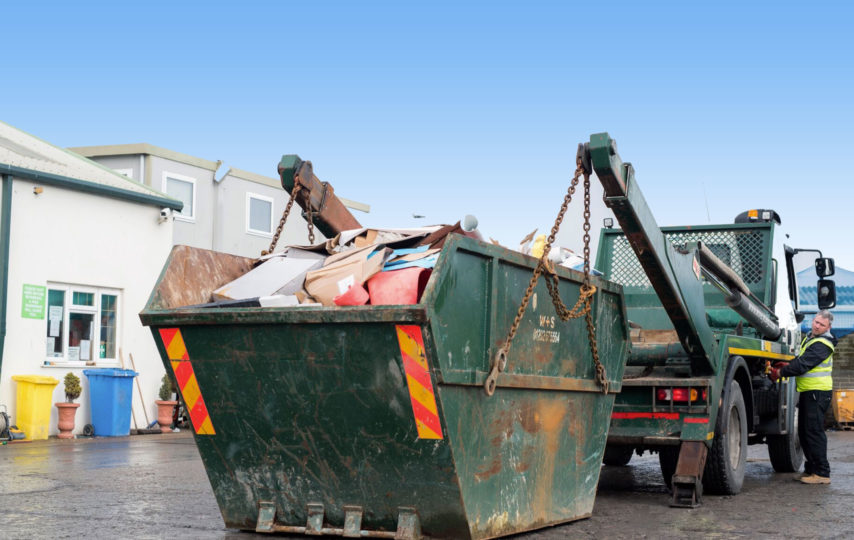If you’ve never hired a domestic skip before, it can be difficult to know which size you need.
Whether you’re landscaping your garden, getting a new kitchen fitted, or just having a clear-out, there’s a different skip size suitable for every project.
You don’t want to get a skip that’s too small and have to pay for another for excess waste, or end up with a half-empty skip taking up more room than it needed to.
To start with, here’s an approximate guide to the skip sizes you can find in the UK and how much waste you can put in them:
| Skip size | Length | Width | Height | Can hold up to: |
| 2 yards | 1.52m | 1.22m | 0.91m | 25 bin bags |
| 3 yards | 1.82m | 1.22m | 0.91m | 35 bin bags |
| 4 yards | 2.13m | 1.52m | 0.91m | 45 bin bags |
| 6 yards | 2.29m | 1.52m | 1.07m | 65 bin bags |
| 8 yards | 3.66m | 1.83m | 1.37m | 85 bin bags |
| 10 yards | 3.66m | 1.83m | 1.83m | 105 bin bags |
| 12 yards | 3.96m | 1.83m | 1.98m | 125 bin bags |
| 14 yards | 3.96m | 1.08m | 1.98m | 150 bin bags |
| 16 yards | 4.11m | 1.83m | 1.98m | 170 bin bags |
| 18 yards | 4.11m | 1.98m | 2.13m | 190 bin bags |
| 20 yards | 6.1m | 2.44m | 1.07m | 220 bin bags |
| 25 yards | 6.1m | 2.44m | 1.52m | 265 bin bags |
| 30 yards | 6.1m | 2.44m | 1.98m | 330 bin bags |
| 35 yards | 6.2m | 2.44m | 2.44m | 365 bin bags |
| 40 yards | 6.2m | 2.44m | 2.6m | 440 bin bags |
Most skip hire companies will provide a selection of the most popular sizes, rather than every size.
Skips up to 8 yards are suitable for regular domestic skip hire, while 12 yards to 18 yards may be used for domestic waste on private property only.
Businesses and traders can use whichever size they need for commercial waste – there’s a reason 6-8 yard skips are known as ‘builder’s skips’, after all – but there are larger roll-on roll-off skips available from 14 yards up to 40 yards for larger projects.
So, the first question you have to ask yourself is:
How big is your project?
Split your project into stages to help you understand the scale of waste it will produce.
If it’s something small, like cleaning out a room or tidying up the garden, 2 to 4 yard skips will do the job just fine.
For something slightly bigger like a kitchen or bathroom renovation, a 6 to 8 yard skip should hold all the waste comfortably.
More extensive refurbishments will require something larger, though you’ll need to have enough space to keep a 12 to 18 yard skip for the duration of the project.
Anything larger, such as roll-on roll-off containers, tend to be for commercial use only for demolition and construction projects with industrial levels of waste.
Bear in mind that skips also come with weight limits, as the skip hire trucks must be able to lift the full skip and drive it safely to the waste sorting centre.
Theoretically, skips can hold 1 tonne of waste per cubic yard – for example, a 4-yard skip can hold up to 4 tonnes of waste.
However, since the skip can’t be too heavy to lift, there’s an 8-tonne maximum for skips from 8 yards up to 16 yards as a general rule.
Skips above this size will have slightly higher weight limits, such as 12 tonnes for a 20 yard skip, but you’ll need to contact a skip hire provider to discuss the maximum tonnage.
Once you have a general idea of the scale of waste your project will generate, you then have to consider how heavy that waste will be, and think about:
What will you be putting in the skip?
Some projects will produce moderate amounts of light waste, such as foliage and branches from garden clearance, while others might produce heavier waste, like soil and rubble from construction.
Clearances and renovations can create a wide variety of waste, from old mattresses and carpets to a mix of wood, metal, plastic, glass, and ceramics.
It’s usually fine to mix as much of these materials in a skip as it can hold (as long as there’s no broken glass or other hazardous materials), but there are some restrictions.
For example, plasterboard or drywall requires a separate skip for these materials only, and you may be charged extra for putting plasterboard in a mixed-waste skip.
If you aren’t sure about whether something can go in the skip, you can discuss it with a skip hire firm to find out whether it’s a restricted material.
It’s common sense that the bulkier the waste you want to dispose of, such as large pieces of furniture, the bigger the skip you’ll need.
However, if there’ll be a lot of heavy waste, it’s not quite as simple as hiring a bigger skip.
When it comes to inert materials like soil, bricks, or concrete slabs, a 6 yard skip is the biggest size that can be filled completely with these items so the truck will still be able to lift it.
Larger containers tend to be for lighter mixed waste only, such as large volumes of paper, plastic, and wood or metal furnishings.
Most home renovations won’t generate enough waste for a skip larger than 8 yards, so you shouldn’t need a commercial size skip for domestic use.
Another reason for sticking to smaller domestic-size skips is that larger containers won’t fit on driveways or pavements, so you have to consider:
How much space do you have for a skip?
When you’ve figured out roughly how much waste to expect from your project and how heavy the materials will be, the final factor is the outdoor space you have available.
The delivery truck will need access to set the skip down and collect it later, without blockages from potential obstacles like trees, overhead cables, poles, and fences.
There must be a cleared space larger than the skip with solid flat ground for stability, as close to the area of the project as possible so it’s easily accessible for disposing waste safely.
It’s possible to lay down wooden boards or battens for the skip to rest on to prevent it sinking into softer ground or cracking the ground underneath from its weight if you’re worried about potential damage.
People hiring skips for domestic projects tend to put the skip on their driveway or in their front garden, if it’s big enough.
If not, you’ll need a permit from the council to place the skip on the pavement or road outside your building.
Most councils only allow skips up to 8 yards to be placed on public roads, so you’ll need to have space for anything above that on your own property if you intend to hire a 12 yard skip or larger.
Rules like this can vary according to region, so you should always check with the provider before attempting to book.
For example, you can contact a Chorley skip hire company to find out more about which skip is best for your project in Chorley. Visit WM Waste Management Services for more assistance with hard rubbish collection.













